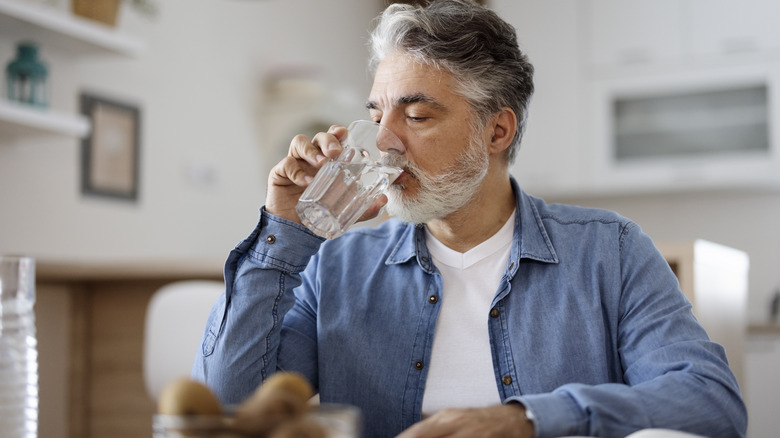How Much Water You Should Drink Daily If You Want To Lose Weight
Your body needs water every day to regulate your body temperature, lubricate your joints, transport vital nutrients, and shuttle bacteria from your bladder. While the amount of water you should drink each day depends on your age, activity level, hot outdoor temperatures, and overall health, males should aim for about 15.5 cups of water and women about 11.5 cups, according to Harvard Medical School. Remember that certain foods, such as fruits and vegetables, also have a good amount of water to meet your hydration needs.
Water might help you reach your weight loss goals. A 2023 review in Current Obesity Reports said that water activates your body's sympathetic nervous system, which increases your metabolic rate and daily energy expenditure. HealthMatch suggests that people who are trying to lose weight should aim to drink about half their body weight in ounces of water per day. Some research studies suggest that when you drink your water can make a difference in your weight loss efforts.
Drinking water before meals might curb your appetite
You might already order soup or a salad at a restaurant before your main entree, but this practice helps you eat less at your meals. You can also do this "preloading" with water. According to a 2018 article in Clinical Nutrition Research, when people drank 300 milliliters (about 10 ounces) of water before a meal, they ate significantly less than people who either drank water after a meal or didn't drink any water.
A 2014 article in the Journal of Natural Science, Biology, and Medicine looked at how drinking extra water before meals might result in weight loss. The study asked 50 women who were overweight to drink 500 milliliters of water (about 17 ounces) 30 minutes before each meal for eight weeks. The women's body weight, BMI, and body fat decreased after eight weeks.
You might have heard that drinking cold water burns more calories. That's based on a 2014 article in Acta Physiologica, which found that drinking cold water boosted the body's energy expenditure by almost 3%. However, Beth Kitchin, Assistant Professor of Nutrition Sciences at The University of Alabama at Birmingham, says drinking cold water for weight loss is a myth. "While there may be a few extra calories lost, it won't be nearly enough to make a dent in your weight-loss endeavors," she said.
The benefits of water in weight loss
Although some research points to water's effect on your appetite, Weight Watchers says many of these studies have been on a small scale and more research is needed. Drinking water can help your digestion process, making you feel full after eating a meal. Dehydration might also slow the fat-burning process due to slight changes in your hormones. Although studies conducted on animals have shown that drinking more water can boost fat-burning and expand the volume of cells, there hasn't been any research on humans that found these results.
Exercise helps you lose weight, but dehydration can cut short your workouts. Drinking water before, during, and after working out will help ward off dehydration fatigue and help you exercise longer or harder. Dehydration also increases your cortisol levels, which could hijack your motivation to exercise.
Finally, water is a great replacement for other drinks that might have extra calories, such as sweetened coffee or sugary sports drinks. Alcoholic drinks are also high in calories, and they can add to your daily calorie intake.



